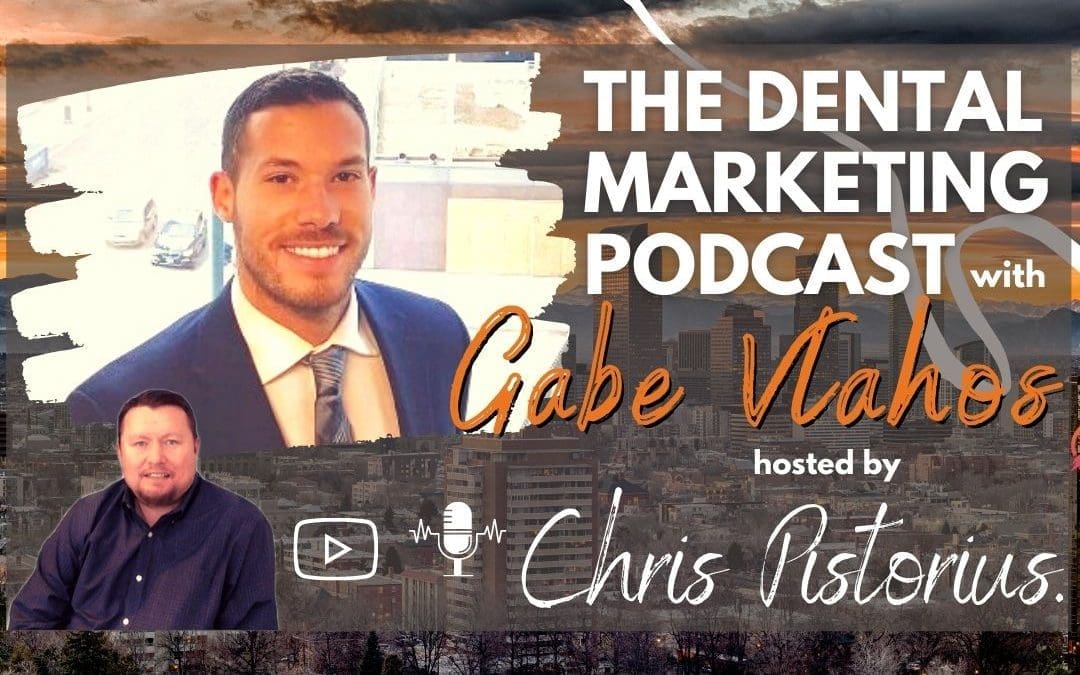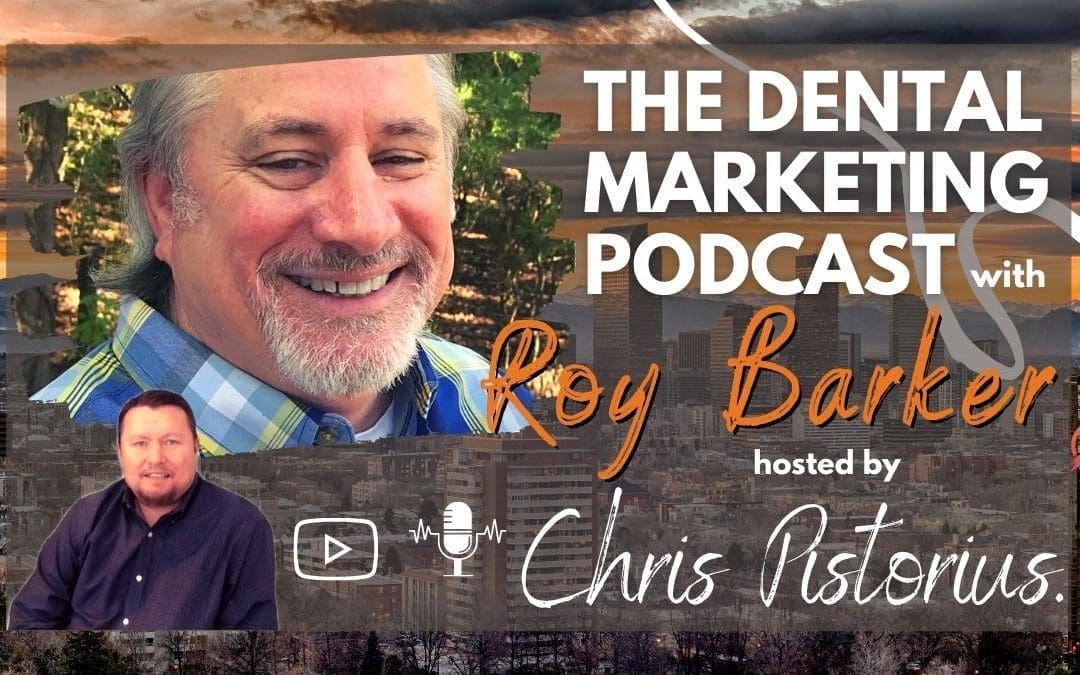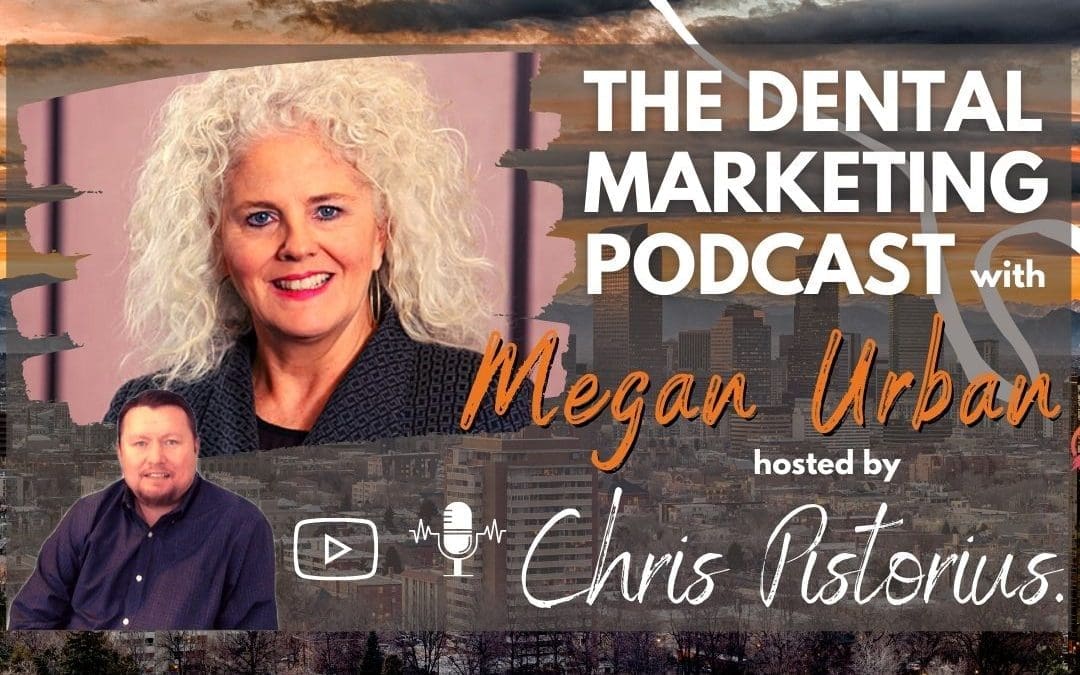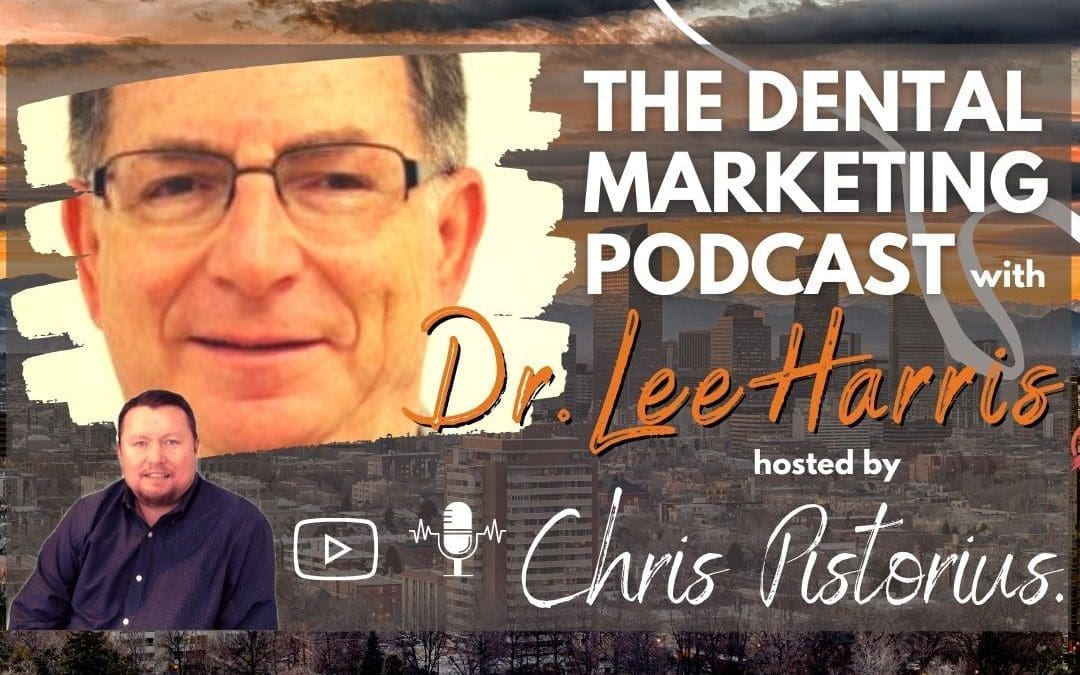
Internal vs. External Marketing For Dental Practices
To get in touch with Lee:
Lee Harris
(714) 293-2195
leeinla915@gmail.com
View Full Transcript
Chris Pistorius (00:03):
Hey, everybody. It’s Chris Pistorius again with the Dental and Orthodontic Marketing podcast. We are busy today. This is our second live interview on Facebook for the day so we’re getting busy on Friday. But we’ve got a great guest with us this afternoon. We have Mr. Lee Harris.
Lee Harris (00:23):
Doctor.
Chris Pistorius (00:25):
Lee is a dental practice management consultant. He is with Harris Dental Solutions. He is coming to us today out of Southern California. Lee, thanks so much for being a part of the show today.
Lee Harris (00:39):
Glad to be here, Chris.
Chris Pistorius (00:41):
Great. Well, why don’t we start off as we usually do, and tell us a little bit about what you do, how you do it and why you do it.
Lee Harris (00:48):
Okay. Well, a little bit of background, I was a practicing dentist from 1974 till about 2004. And at that time I was starting to feel my way through consulting and I started my consulting practice in 2001 while I was still practicing. And now I’ve been a full-time consultant since about 2007 or ’08. All I do is consulting for dentists who need help, either startups or practices that have plateaued and doctors don’t know what to do to get their practice moving and I help them do that.
Lee Harris (01:24):
I do policies and procedures, set up efficient systems in their practice, and then we go ahead and do some marketing and get them growing. We want to make sure that patients don’t go in the front door and out the back door. So we don’t want to do any marketing until we make sure that every system in the office and the employees are well-trained and you take care of the patients in a compassionate and quality manner.
Chris Pistorius (01:50):
Awesome. That’s a lot there. And a couple of things that stand out for me. I’m going to hit you with first, plateau. I’m sure there’s a lot of dentists that are watching this that could be in that boat. And COVID probably spins that a little bit, too, but talk to me about what you would define as a plateau when it comes to this.
Lee Harris (02:09):
Okay. So, in normal businesses, I’ve been in the business community, worked for the insurance industry for about 18 years. And they look for 15, 16% growth a year. Yeah, if you get five to 10, 15, your shareholders or your investors are happy. So, I would look at plateau as anything where you’re not growing, growing two or 3% is just keeping up with inflation, but you’re really not growing. So if I’ve got a practice that’s coming to me and they’re doing $100,000 a month but they could be doing $200,000 a month and they just can’t seem to get over the hump, that’s when I shine, that’s when I can help them. And usually it’s back to basics because the offices are kind of confused. They don’t know where they are and we can help them out in putting them on the right path.
Chris Pistorius (03:01):
Yeah. Being a dental marketing agency owner, we get hit with some of these clients. They’re like, “Things were going great and we were growing and then all of a sudden, we’re just kind of staying the same.” And it’s interesting how that happens. And it happens in a lot of different things. So I think sometimes just some new creative ideas can really spark that so it’s interesting that you bring that up.
Chris Pistorius (03:28):
The other thing that you mentioned in your intro was making sure patients aren’t coming in the front and going out the back door, right?
Lee Harris (03:36):
Absolutely.
Chris Pistorius (03:37):
And we see this a lot. Yeah. We see this a lot here at KickStart where everything’s focused around, “I need new patients. I need new patients.” And I’m like, “Yeah, you do, but first let’s talk about what’s going on with your current patients. Are they coming back? Are you doing anything to reengage inactive patients?”
Lee Harris (03:56):
Well, I’m glad you mentioned that Chris-
Chris Pistorius (03:57):
Right, right.
Lee Harris (03:59):
… because internal marketing comes first.
Chris Pistorius (04:01):
That’s right. You got it. And what’s crazy about it is that everybody’s focused in my industry on new patients and all my competition’s all about new patients, new patients, but there’s very few agencies and probably consultants like you that are like, “Wait a minute. You’ve got this whole group of people that already know you, like you, and trust you,” hopefully, “let’s focus some of this money on bringing those folks back in.” Is that kind of what you’re talking about with that?
Lee Harris (04:29):
Absolutely, Chris, you’re so right because, and that’s what I focus in right away. Because if your staff isn’t treating your patients warmly, if your back office is not doing things efficiently, if there’s not systems set up and customers are going to be, patients are going to be unhappy, then they’re not going to start referring their friends. Or you may not be taking advantage of the patient base, as you mentioned, that you already have. And so a lot of things that can be done.
Lee Harris (04:59):
Dentists don’t even know how to ask their patients to refer them, family members or friends or acquaintances and they just need to get help with that. And we help them with that. But first we focus on the systems. We focus on what they already have. And then, when the staff is trained and ready to go and primed and all the systems are working, and the internal marketing has stepped up a bit and you can see your patients rise.
Lee Harris (05:25):
I mean, I had a client just this past year, COVID hit, he was getting five, six new patients a month, really poor. We just fixed the systems. Didn’t do anything but talk about internal marketing and he’s doing 15 to 20 new patients a month now. And we’re almost ready to go to external marketing because he’s starting to get-
Chris Pistorius (05:45):
That’s awesome.
Lee Harris (05:47):
… his own patients to come in, the systems are better, the staff is retrained. We had to get rid of few people, but that’s what we do and that works. [inaudible 00:05:56]
Chris Pistorius (05:56):
Yeah. Maybe you could, just for the people listening that maybe aren’t quite so sure, could you explain what you’re talking about with the difference between internal marketing and external?
Lee Harris (06:06):
Sure. Internal marketing is you want to talk to the patients you currently have in your practice. Most of the practices that I go to, some not, have some kind of customer relationship management software, brand names Lighthouse, Practice Activator, Demandforce, there are a million of them out there. But you just got to use one of them and get it to work for you. That allows you to do newsletters. It allows you to do surveys. It allows you to contact your patients by email and text and allows you to communicate with your patients in a more proactive manner. So, that’s one thing you do.
Lee Harris (06:44):
The second thing is you reach out, you ask. If somebody walks out and they are happy with the treatment you just gave them, what’s wrong with asking?
Chris Pistorius (06:53):
Right.
Lee Harris (06:53):
Another thing is that we use what I call a comp card program, where you give some incentive for the employees in the office to give their card out and have them give it to a friend and have them bring in the patients. And in some practices, this works really well. And not only does the patient get a discount off their bill, but the new patient gets a credit toward their first exam. So it kind of works out and the dentist and the patient and the referral source are all working out and benefiting from this program.
Chris Pistorius (07:29):
Yeah, that’s awesome. And there’s a ton of creative ideas like that that if you can really get into, it can make a big difference. We talk all the time here about a dentist isn’t a dentist, right, meaning you’ve got to be different somehow.
Lee Harris (07:45):
Right.
Chris Pistorius (07:45):
You’ve got to show some sort of a unique selling proposition that distinguishes you from the competition because, Lee, there’s some markets we go into with a client, there’s 50 dentists within two or three square miles, and they’ve got to be able to distinguish themselves differently than the others. So, I think those are some great, great creative ideas. So I want to [crosstalk 00:08:07]-
Lee Harris (08:07):
Well, the other thing is that leads me to the external marketing.
Chris Pistorius (08:09):
Right.
Lee Harris (08:09):
Because in the external you have to have a uniqueness proposition, as you mentioned, Chris. So you’ve got to find something that’s going to attract patients to pick you rather than the 49 other dentists in the area that are your competitors.
Chris Pistorius (08:23):
Right.
Lee Harris (08:23):
What’s unique about you and tell them about yourself in the external marketing. And the external is people like KickStart Marketing or any of the many marketing firms out there. One thing I have to say and add is that some of these firms are not as good as others. You got to get one that’s going to stick with you. And most of them are great for the first two or three months and then they kind of drop the ball.
Chris Pistorius (08:47):
Yeah.
Lee Harris (08:47):
So you have to find one that you rely upon and one that you trust and that you can feel pretty assured that they’re going to take you through soup to nuts of building your web presence, your other presence in the market of Facebook, Instagram, whatever you choose to use, Google Ads, whatever it is, you need to establish a consistency with that and make sure that that unique message gets out there.
Chris Pistorius (09:16):
Yeah, absolutely. There’s no question. And it’s a beautiful thing when you can get the internal marketing and the external marketing working at the same time. We talk about not putting all your eggs in one basket. We try to, when we do external marketing for clients, we talk about creating seven or 10 different baskets and putting an egg in each one of those, right?
Lee Harris (09:37):
Right.
Chris Pistorius (09:37):
Because the buzzword these days in marketing is search engine optimization. Get your website to rank and no doubt that that’s an important strategy, but guess what? We don’t control that, the client doesn’t control that, Google controls that. So just because we get somebody ranked on top of Google in a certain city for dentists near me, Google can change their algorithm-
Lee Harris (10:01):
Absolutely.
Chris Pistorius (10:01):
… or the rules that they use to rank and one day you’re number one and the next day you’re page five, right?
Lee Harris (10:07):
Right. And the other thing is, yeah.
Chris Pistorius (10:09):
Yeah. So, if that’s all you’re relying on for your new patient leads, then you’re in a world of trouble. So I think it’s best to build a strategy that’s got multi places to get new patients. I’m sorry, what were you going to say?
Lee Harris (10:21):
Oh, no, I’m sorry for interrupting. So I think that’s very true. And that’s why I say that there’s no one strategy that works for every dentist.
Chris Pistorius (10:31):
Right.
Lee Harris (10:31):
Every dentist is different. Every dental office is different. I can have a dentist on this street that’s doing great on Google and in the same city, just a couple of miles away, Google doesn’t work for them at all, but Yelp does, or Facebook does, or Instagram does. And I find that getting employees involved with posting Instagram pictures of actually having patients in the chair, this has worked great for practices that I know of, especially when it involves kids or a great result, and you can get it out there to a network of people that will see it. It’s fantastic.
Lee Harris (11:09):
But just as you say, not any one solution is going to work for every dentist. It’s got to be [crosstalk 00:11:16] and you don’t want to spend all your money on external marketing, but you got to have a strategy. So you find out what’s going to stick to the wall and then go with that and the only way to find out what’s going to stick is to do a lot of things.
Chris Pistorius (11:31):
Yeah. And 15 to 20 years ago, or maybe even less, the marketing mix, you go buy a Yellow Page ad, you maybe do some direct mail and it worked and you’re kind of set. And what we’re seeing now in this environment is another level of complexity with the internet. And now there’s 500 places that a dentist could potentially spend money and they’re getting calls from people, “Spend here, spend here.” And what, unfortunately, what I see that leads to sometimes is a dentist, or really any professional can just kind of say, “This is overwhelming. I’m going to put my head in the sand and do nothing.”
Chris Pistorius (12:07):
And that’s the worst thing that you can do right now, because you’re going to get passed up by your competition who is trying to figure it out. So I think it’s important for dentists sometimes to get help from people like you, people like me, get some opinions, come up with some ideas that can strategically get them ahead. Would you agree with that?
Lee Harris (12:30):
I definitely would agree with that. Seek professionals that you can trust and you know. And the other thing I might say is that COVID really has impacted the dental industry big time. And maybe what worked before COVID doesn’t work now.
Chris Pistorius (12:44):
Right.
Lee Harris (12:44):
That’s because the market’s changed. One of your unique things might be to explain, especially here in Southern California, Los Angeles was hit pretty hard with COVID, so part of that uniqueness formula is saying, “Well, what did you do in your office that sets you apart for protecting the safety of the patient and the employee from the spread of this infection,” may be a good way to go right now because dental offices are severely hurt. The best one I know of is down 15, 10, 15, 20%. So you’ve got to get out there and do something different now. And that’s a challenge for every dentist to be able to figure out what do I do now that times have changed. And so everybody has to be thinking about new ideas or strategies to get the more concerned patient out there.
Chris Pistorius (13:42):
Right. Yep. So what would you say to somebody that’s kind of, they might be watching this, or they may have been thinking about this for a while, they’ve plateaued, or maybe they’re just starting out and they’re really ready to take their practice to the next level. Obviously, reaching out to somebody like you is helpful, but what else can they do to kind of prepare for this type of growth?
Lee Harris (14:02):
Well, as I said in the beginning, get your house in order first. So that would be, to me, the first thing is make sure you got a good friendly staff. Your front office person has to have a lot of bubble. I used to use the term brain dead and non-dental because if you just want a bubbly personality that can engage that customer, that patient on the telephone and just be bright and smiley and cheery so you can see the smile through the phone. And so you have to have good and there’s a lot of AI going around in dentistry right now to listen to calls and to see exactly what your front office is saying because if you’re back in the chair, you’re not going to know what’s going on.
Chris Pistorius (14:46):
Right.
Lee Harris (14:47):
Somebody like me, a consultant, a lot of consultants give you a workbook and say, “Do this,” or, “Do that.” I’m in the office with the dentist, with the staff, working with them and getting them to understand what’s important. So, once you have all that in place, then you need to find a reliable and trustworthy marketing firm that has good and talented people that can research your specific area and recommend strategies that might work for you. And the dentist needs to understand that, “Oh, we’re going to try two or three strategies or four strategies for the first three months and if that doesn’t work, we’re going to go to two to three more.” So you have [crosstalk 00:15:28]-
Chris Pistorius (15:28):
Right.
Lee Harris (15:29):
… flexible and adjustable to figure out what’s going to work for you for each individual dental practice. There are no two alike.
Chris Pistorius (15:36):
Yeah. I really like your idea of hiring a marketing professional. I really like that idea.
Lee Harris (15:41):
Well, and I know you do. And the other thing is that me as a consultant, I don’t pretend to be a marketing guru. What I tell my clients is, “If I can’t do something, I’m going to bring in somebody I know is reliable and can do it for you.”
Chris Pistorius (15:57):
Right.
Lee Harris (15:59):
I don’t pretend to be a marketing person. I wouldn’t pretend to do what you do, nor would you pretend to do what I do.
Chris Pistorius (16:05):
Right.
Lee Harris (16:06):
So I would recommend marketing professionals to get out there and recommend a strategy once they learn about your practice and what your growth opportunities are and what the dentist’s vision for his future is.
Chris Pistorius (16:20):
Yeah. So, when somebody calls us for the first time, we kind of go through this needs analysis call, right, where I’ve got a list. And everybody that comes into our company, client wise, I talk to first, because I want to kind of interview them a little bit and make sure that what their goals are kind of align with what we do here. And so we ask questions. I ask questions to them about things like, “How much is each new patient worth to you over a year, over a lifetime? How many referrals on average does a new patient bring to you over the lifetime of being a patient,” big questions like that. And a lot of times I get kind of that deer in the headlights look like, “Uh.”
Lee Harris (17:03):
[crosstalk 00:17:03] they don’t know the answers to that.
Chris Pistorius (17:04):
Yeah.
Lee Harris (17:04):
And it’s because they can’t get information from their system because they have not studied it.
Chris Pistorius (17:10):
Right.
Lee Harris (17:10):
They could get that information. You can print up a referral report from any of these systems that will tell you every one of your patients and how many people they’ve referred to you. They can tell you how many patients you’ve had. They can tell you how much the average spend per year is per patient.
Chris Pistorius (17:23):
Right.
Lee Harris (17:23):
They can tell you all that stuff. You just got to look at it and you have to know what to look for.
Chris Pistorius (17:28):
Yeah. And what I find almost scary is that they’re ready to grow. They’re ready to spend a bunch of money. And I’m probably just one of a few marketing companies that they’re interviewing, right?
Lee Harris (17:38):
Right.
Chris Pistorius (17:38):
But they don’t know these numbers. And I’m like, “Wait a second. We’ve got to figure some of this out before we start going throwing thousands of dollars in the market trying to find you new patients.” Because you don’t know who the new patient is you’re trying to bring in, what they look like, how much money they spend. Do they own a car? Own a home? Things like that.
Lee Harris (17:56):
Exactly.
Chris Pistorius (17:57):
They don’t necessarily know where those people are. If they don’t know their numbers of their business, I guess, and they don’t understand who they’re marketing to, and they don’t understand what their unique selling proposition is, then marketing is going to be more difficult for them. It’s likely not to be as effective and it’s going to be very expensive. You know what I mean?
Lee Harris (18:17):
Absolutely. And you said one thing there that really peaked my interest in, and that’s a lot of things that dentists don’t do is they need to know who their target market is.
Chris Pistorius (18:25):
Right.
Lee Harris (18:26):
And I think a lot of times they don’t. I even get dentists who come to me and say, “I’m going to buy a practice over here.” I say, “Well, wait a minute. Before you decide to buy a practice, what kind of dentistry do you want to do?” Because many, many dentists buy practices, find out, “Oh, that’s not the kind of dentistry I want to do. That’s dentures and fillings and I want to do implants and overdentures.” And so you have to find out what your practice is going to be and what you want to do and kind of marry the two together. And it has to be congruent or else you’re just barking up the wrong tree.
Chris Pistorius (19:02):
Yeah.
Lee Harris (19:02):
So I think it’s important to know who your market is at and where are they, and is this kind of practice, is the location in a good spot to be able to capitalize on that target market because if it isn’t, then it’s not going to work either.
Chris Pistorius (19:17):
That’s true. Yep. So let’s shift gears a little bit and I want to get into a problem that I’ve been hearing a lot lately, and I’m not sure if it’s COVID related or not, really, but I think this was going on prior to COVID, but it’s with hiring. I have a lot of practices that are reaching out to me saying, “Chris, it seems like we hire somebody, train them, they leave. We hire somebody, we train them, they leave.” And they’re in this constant churn of hiring, firing, and they can’t find good quality people that are doing a good job. Do you help in any capacity with that? And if so, what kind of advice do you have?
Lee Harris (19:54):
Well, I’m glad you brought this up because this is a real problem right now. It’s been exacerbated by COVID because there’s a lot of women now that are no longer in the workforce because they have kids and they don’t have childcare. And so they can’t come back to work. So you lost a lot of dental assistants that are out there. The other problem is, is that the dentist’s biggest challenge is managing human resources. They don’t know how to do that. And so that causes some of the churn. You’ve got a [inaudible 00:20:25] and there’s a lot of books out there and one of the quotes I get from one of these books, I read, Traction, I think it’s called, is people in the right seats.
Chris Pistorius (20:34):
Right.
Lee Harris (20:35):
You have to have good people. And just like I was telling you to put that brain dead, not bubble person at the front desk, that’s what you want. You want a person at the receptionist desk who’s going to be outgoing and friendly.
Lee Harris (20:49):
You don’t want somebody who’s you can’t see a smile through the phone, so you have to have the right people and then you got to pay them right.
Chris Pistorius (20:57):
Right.
Lee Harris (20:58):
You’ve got to treat them right. And the other thing I find is a problem with dental offices losing people is chaos in the office. You might have one bad apple in the office that causes a whole lot of drama-
Chris Pistorius (21:12):
Drama, yes.
Lee Harris (21:13):
You don’t need the drama, right? So it’s better to act early, get rid of that loose cannon and get somebody else in the office even if you have to struggle for a little bit until you get the right person in the right seat.
Chris Pistorius (21:27):
Yeah. I agree. And you know what I’ve found on that, and I’m just talking with dental professionals, certainly no scientific evidence, but I’ve found that some people are having really good success with hiring people with no experience. And the reason for that is, is that they’re very coachable, right? Versus bringing somebody in with a ton of experience, you may not be able to coach them up the way that you want to do things. There could be some resistance or friction there, right? And these people are coming in and they have to do more training with people that don’t know the industry and don’t know dental, but they’re finding longer term success with that. Have you had any experience with that?
Lee Harris (22:06):
Absolutely true. Couldn’t agree more.
Chris Pistorius (22:08):
Okay.
Lee Harris (22:10):
I find that even dental assistants, you hire somebody that doesn’t know a whole lot, but they don’t have any bad habits. And you’re talking about the people that have been in the industry 15, 20 years, they’ve got all those bad habits and they only want to do it their way and their way might not work for your office.
Chris Pistorius (22:26):
Right.
Lee Harris (22:26):
So somebody who’s fresh and new that might be just out of school or have minimal training is a good way for the dentist to get them to do it their way. And if you take good care of those people and you train them and educate them about the industry and about them, they’re going to be with you for a long time.
Chris Pistorius (22:45):
Right.
Lee Harris (22:46):
That’s what you want. First of all, you want your patients to see the same people, the same dental assistants, the same hygienists, the same receptionist every time they come in, because they know them by their first name. And the people who talk more to the patients than the dentist are the staff, the hygienist, the front office. Those are the people that bring the patient back into the office. Yes, the dentist has to be good at what he does. He’s not the one that really has a relationship with the patient unless the patient’s been coming for 15, 20 years or so.
Chris Pistorius (23:18):
Right. Yeah. Well said. Well, we’re going to start wrapping up here, but I wanted to ask you any additional nuggets of wisdom, and I know you’re coming from insurance experience, dental, you’ve come from all sides of this. So I’m sure you’ve got a ton of these, but what’s one piece of advice you’d like to share with everybody right now?
Lee Harris (23:38):
Well, I’m talking to the dentist now, okay?
Chris Pistorius (23:42):
Okay.
Lee Harris (23:42):
You can’t be everything to everybody, okay? You’ve got to focus on your niche in the industry. You’ve got to focus on what you do best and what you like to do. If you’re going to be in practice for a long time and be successful, you’ve got to be happy in what you’re doing every day. And if you spread that happiness and that warmth to your staff, then it will rub off on your patients. They will be able to see it and they’ll be glad to come into your office. So that homogenicity of getting people of the same wavelength and having consensus. And if you’re building a new policy, get your staff’s input. Say, “Look,” and here’s what I tell my folks, I say, “Look, I’m going to write this policy, but I’m not here to do the work. You are.”
Chris Pistorius (24:28):
Right.
Lee Harris (24:28):
“So, the policy’s dynamic. Make a recommendation to change it, we’ll change it.” It’s all about efficiency and making the staff a part of the solution.
Chris Pistorius (24:38):
Right, right. I think that’s great. Well, Lee, if somebody sees this and there’s going to be a lot of people viewing it, but what’s the best way to reach out to you if they want to kind of start the process of maybe getting some help professionally from a consulting perspective?
Lee Harris (24:53):
There’s the two best ways to get ahold of me are my email leeinla915@gmail.com or you can phone me at (714) 293-2195. You can also visit my website at harrisdentalsolutions.com.
Chris Pistorius (25:10):
Awesome. I’ll make sure that we put all of that in the post, on the podcast and everywhere else that this is broadcasted as well. Lee, I know you’re busy and I appreciate all the time that you’ve spent here. Maybe in a few months, we can catch up with you and see how thing’s going and hopefully we’re getting past COVID at that point and we can see what the future holds, if that’s okay.
Lee Harris (25:31):
Sounds good with me. It’s been my pleasure, Chris. Thanks for helping.
Chris Pistorius (25:34):
And thank you to everybody for watching today. I hope you got a lot of great information from Lee. He’s got tons of experience in the industry and can definitely help your practice get to the next level. Thanks again for watching and be sure to check out our next episode in about a week. Thanks and talk to you soon.

